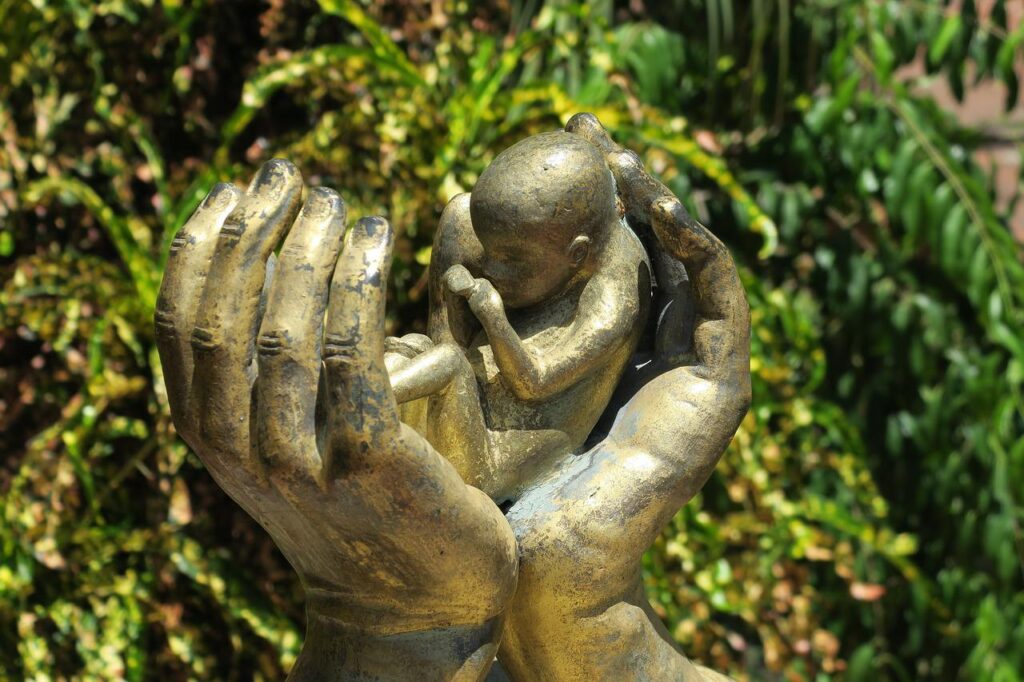Content Warning: abortion, infertility, pregnancy loss

Statistically, you probably know someone who has had an abortion. Were you a safe enough person for them to trust with that information? Did you work to create an environment where they were less afraid of being open about their experience? Maybe you were the one who had the abortion. Did you feel like you could talk about it with others close to you or that it was something you had to go through alone?
I know of at least four women who have had an abortion. These women come from different generations and walks of life, and they have different religious beliefs or non-beliefs. One is an atheist, one is a non-denominational Christian, one is Catholic, and one is Mormon and a member of the Church of Jesus Christ of Latter-day Saints. Like most abortion patients in the United States (though it is worth noting only two of the four are American), all of them are mothers.
I’ll be the first to admit I haven’t always been a safe person to whom to disclose an abortion. Well before I converted to the Church of Jesus Christ of Latter-day Saints as a young adult, I was rigidly pro-contraception but anti-abortion. I believed life must begin at conception because I couldn’t imagine when else it could be. To declare any other moment (e.g., the heartbeat, the first movement, etc) the start of life seemed arbitrary to me.
What I didn’t realize then was how arbitrary of a measure conception is as well. Why not implantation? Why not viability? After all, if life begins at conception then natural procreation is not only inefficient but murderous. About 10-20% of known pregnancies end in miscarriage, but if you add the number of fertilized eggs that never implant or never develop to the point of detection then that percentage is much higher. Why would God allow so many children to die unborn and unknown?
In this context, the logical conclusions of the belief that life begins at conception are problematic for even the most staunch pro-life advocate. If the loss of a fertilized egg is a death equal to the loss of a full human life, then we should prevent as many deaths of the unborn as possible. It is easy to imagine a near future scenario where advancements in in vitro fertilization and other reproductive technologies yield a success rate for viability higher than sexual intercourse.
In that case, the belief that life begins at conception would lead to the inevitable conclusion that conceiving via sexual intercourse, a method that would result in countless preventable deaths of human beings, is unethical and selfish. Even though millions of people want to outlaw abortion to prevent the loss of life defined as a fertilized egg, I have yet to meet a single person who is comfortable with the idea of outlawing sexual intercourse that could result in pregnancy once technology makes it possible to save many of the fertilized eggs that would have been lost by natural miscarriage.
The views of leaders and members of the Church of Jesus Christ of Latter-day Saints on abortion have changed significantly. (It’s worth reading Em’s posts on Utah abortion history in the 19th century for more context: Part 1 and Part 2.) Today, the Church website notes that prophets have denounced abortion but immediately acknowledges that abortion is not only permitted but may even be justified “when pregnancy is the result of incest or rape, when the life or health of the mother is judged by competent medical authority to be in serious jeopardy, or when the fetus is known by competent medical authority to have severe defects that will not allow the baby to survive beyond birth.” What strikes me about these exceptions is that they are highly personal: no one looking at someone from the outside can truly know the circumstances of the pregnancy, the physical and mental health of the pregnant person, or the condition of the fetus. Those details are between the pregnant person and their doctor. As TopHat wrote eight years ago, this stance makes the Church by definition pro-choice.
As I have grown older and become a mother and listened to those around me share experiences of infertility and miscarriage and abortion, I realized that we know nothing about when life begins. At first, this idea disturbed me. If we don’t know exactly when life begins, then how do we know exactly when terminating a pregnancy is equivalent to terminating a life? Over time, I have come to believe that no matter how far science progresses we can never truly know this information. With mere human understanding, we are incapable of comprehending something as profound as Life and Beginning in the way God can, at least not in this mortal sphere.
What does this mean for us? For me, it’s meant approaching the issue of abortion with greater compassion for others and greater humility for my own limitations than ever before. 1 Nephi 11:17 gives us a model for faith in such cases when our knowledge is meager: “I know that he loveth his children; nevertheless, I do not know the meaning of all things.” It is impossible to know all things, but it is a commandment to love God and to love one another. Is the way we talk about abortion showing love to God and others? Or are we casting stones?
Most people don’t identify with either extreme when it comes to stances on abortion but rather have nuanced views somewhere between “always illegal” or “always legal”. Conversations with one another are crucial for reducing stigma, increasing understanding, and advocating for better policies. We don’t have to have all the answers about abortion but rather can ask ourselves important questions about our own thoughts and actions.
Would you change the way you talk about abortion with your family, neighbors, and friends if you knew someone among them had had one? Would you change the wording of your social media post or refrain from posting it altogether if you knew it would cause additional pain to someone who had had an abortion or was considering one? Would you open your heart and mind to increased understanding if someone you love shared their experiences with you? Would you put your political views aside long enough to minister to someone who needed your help or kindness? In my experience, those small and simple changes in priorities and perspectives can make all the difference.






4 Responses
I wrote a story back in the 90s about a polygamous wife who gave herself an abortion using herbs. I included the recipe for the herbs. The deeply offended chair of the department where I taught at BYU fired me right away: “you’re not suitable for BYU students.” Because the story showed why a woman might need an abortion for her mental health. It was a fine story (you can find it in my book on Amazon)–that’s why the chair fired me; it was effective and powerful. This is the thing: the gospel is pro-choice; every spirit will fulfill the measure of its creation; every woman knows better than anyone else whether she can mother a child conceived in her womb, and why or why not. I am adamantly pro-choice, fierce about it. This is an excellent post and I support it, and will share it, wholeheartedly.
People have abortions for a myriad of reasons, none of which is anyone’s business. Someone who has had an abortion can choose to speak about it, but should never be forced or pressured into doing so. People who are entrusted with such information should take it seriously and not break that trust under **any** circumstances.
Also. I think about this article published on By Common Consent a lot:
https://bycommonconsent.com/2020/10/28/reflections-on-heartbreak-and-choice/
I wonder how many women I’ve attended church with over the years – Nursery leaders, Primary teachers/counselors/secretaries/teachers, YW presidents/counselors/secretaries/advisors, Relief Society presidents/counselors/secretaries/teachers – have made this heartbreaking decision themselves, but have kept it quiet due to the stigma and risk of church discipline. I wonder how many faithful LDS women continued carrying a pregnancy with genetic defects and/or a life-limiting diagnosis not out of choice, but due to obligation, pressure, and fear of how their church leaders and fellow congregants would react. I wonder if those women feel any resentment about being saddled with such a pregnancy and what comes after.
We should **all** be pro choice. The decision over whether or not to continue or terminate a pregnancy should belong to those whose lives will be most affected by it, based on **their** assessment of **their** specific circumstances, **their** research, **their** physical and mental health, and **their** beliefs. It’s not our place to judge, only to have compassion and a safety net for those who have been through that experience.
Agree 100%.
This is a lovely, clear, hopeful explanation. Thank you.